高中英语Unit2PoemsSectionⅡWarmingamp;ReadingLanguagePoints教学案
高中英语 Unit 2 Poems warming up and reading教案 新人教版选修6
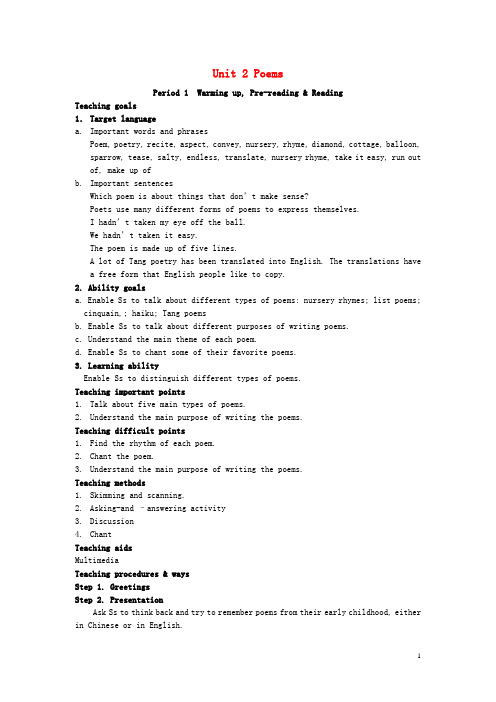
Unit 2 PoemsPeriod 1 Warming up, Pre-reading & ReadingTeaching goals1.Target languagea.Important words and phrasesPoem, poetry, recite, aspect, convey, nursery, rhyme, diamond, cottage, balloon, sparrow, tease, salty, endless, translate, nursery rhyme, take it easy, run out of, make up ofb.Important sentencesWhich poem is about things that don’t make sense?Poets use many different forms of poems to express themselves.I hadn’t taken my eye off the ball.We hadn’t taken it easy.The poem is made up of five lines.A lot of Tang poetry has been translated into English. The translations havea free form that English people like to copy.2. Ability goalsa. Enable Ss to talk about different types of poems: nursery rhymes; list poems; cinquain,; haiku; Tang poemsb. Enable Ss to talk about different purposes of writing poems.c. Understand the main theme of each poem.d. Enable Ss to chant some of their favorite poems.3. Learning abilityEnable Ss to distinguish different types of poems.Teaching important points1.Talk about five main types of poems.2.Understand the main purpose of writing the poems.Teaching difficult points1.Find the rhythm of each poem.2.Chant the poem.3.Understand the main purpose of writing the poems.Teaching methods1.Skimming and scanning.2.Asking-and –answering activity3.Discussion4.ChantTeaching aidsMultimediaTeaching procedures & waysStep 1. GreetingsStep 2. PresentationAsk Ss to think back and try to remember poems from their early childhood, either in Chinese or in English.Talk about some famous poets both home and abroad, either ancient ones or modern ones.Brainstorming: What will you think of when we talk about the word “poem”? Step 3. Warming upRead the questions in this part, reminding Ss what they notice about the above poems.(e.g. they have a strong beat, or they have rhyme, or they play with words and sounds, or perhaps some of them are funny because they make no sense.) Tell Ss that there are many reasons why people write poetry. Give the examples on the Bb. Ask Ss why they think the poets wrote the poems they have just recited.. Write their suggestions on the board.Give Ss a time limit of a few minutes. Divide the class into groups of four to discuss the purpose of writing poems. Ask one person from each group to read their group’s list and add their suggestions to the list on the board. (Suggested reasons: to create certain feelings or images in the reader; to share a feeling or experience; to describe something in detail or give an impression; to get the reader to think about an idea; to express a point of view; to make the reader experience the sight, sounds, smells, feel and tastes of something; to create a mood, to play with words--- their sounds, rhyme and rhythm.)If time permits, in small groups or as a class, discuss the kinds of topics that poets write about.( people, animals, nature, landscapes, the sea, the seasons, stories, death, war, youth and old age, feeling and experiences, emotions like love, hate, sadness, regret and desire, etc.)Step 4. Pre-readingPeople from different countries write different kinds of poems. Get Ss to discuss the questions on Page 9 with their partners: Do you have a favorite poem in Chinese? Why ? Do you have a favorite poem in English? Why?As to exercise 2, give Ss practice in an important reading skill: scanning a text, that is, looking through a text quickly to find specific information. Read the table in exercise 2 with the Ss. Tell them that they are going to look for the information in the table, just in the poems themselves, not in the other parts of the text. They are to look only for those pieces of information and not read every word. Do an example with them.Suggested answers to exercise 2:ScanningGet the Ss to read the passage quickly and accurately and meanwhile help the Ss to form a good habit of reading. Teacher gives Ss a couple of minutes to look through the whole passage. Tell them to read the text silently and then ask some detailed questions about the text on the slide show . Teacher should encourage Ss to express their ideas.Q1. Why do people write poetry?Q2. How many forms of poems are mentioned in the passage? What are they?Q3. What does “nursery rhyme” mean? Why do they delight small children?Q4. What’s the characteristic of “list poems”? What about “cinquain”?Q5. Why do English People like “Haiku”?Q6. Are you familiar with Tang Poems? Do you know the title of the last poem in the text?ListeningBefore Ss read the text, have them close their books and listen to the text with their eyes closed. This gives Ss the opportunity to listen to the sounds or “music” of the poems before reading them in detail. Tell them that it doesn’t matter i f they don’t understand every word.First readingGet Ss to read the text carefully, finding the one sentence that sums up the paragraph of each part.. Underline the topic sentence.Second readingTell Ss that they are going to look at the rhythm of two of the poems. Make sure they know what rhythm is. Read the limerick aloud and have Ss listen for the strong beats. Then have them clap the strong beats as you read. Mark the strong beats on the limerick on the board.There was an old man with a beardWho said “it is just as I feared”.“Four in sects and thenTwo birds and a henHave all made a home in my beard”.Now read the poem A & B. Ask them to mark the strong beats on the two poems that have a strong rhythm. Check their answers . Then play the tape and get them to clap to the strong beats in those two poems.Third readingJust as any scene can serve as the subject of a painting, so any part of daily life can provide material for a poem.. Of course, the choice that the artist or poet makes relates to his or her purpose. Poetry is usually short and compact, so it should be read several times, preferably aloud, to appreciate its meaning. Read the last poem (Poem H), and answer the following questions:Q1. What parts of the poem suggest that the woman loves her husband?Q2. How do you understand the sentence” Should the journeyer return, this stonewould utter speech.”? Explain the sentence in your own words.Q3. What picture do you have in your mind when you read the above sentences?Q4. Do you know the Chinese title of this poem? Do you know the Chinese version of the poem?Step 6. Make a short summary of this period.Homework1.Surf some websites to find out more information about poets.2.Review the content of the reading passage.3.Finish the exercises on Page 12& 13.。
人教版高中英语选修六Unit2PoemsWarmingupampReading课件

我爱祖国,但用的是奇异的爱情!
Step3: Reading
我爱祖国,但用的是奇异的爱情!
Fast reading
1. What is the main idea of the reading passage? A brief introduction of a few simple forms of English poems.
a few words
The _t_r_a_n_s_la_t_io_n_s_ have a free 5.Tang
form. Poems
我爱祖国,但用的是奇异的爱情!
Careful reading
Task1 1. Poems A and B have a strong rhythm. Listen to the tape and find th words that rhyme in Poems A and B.
Nursery
rhymes 童谣
我爱祖国,但用的是奇异的爱情!
What’s the characteristics of them?
Forms of Poems
1_N_u_r_s_e_ry __rh__y_m_e_s
Characteristics
Have strong __r_h_y_th_m___ a_n_d__rh__y_me Have a lot of repetition Easy to learn and to _r_e_c_it_e____
rhythm ['riðəm ] n.节奏,韵律,节拍
我爱祖国,但用的是奇异的爱情!
Before my bed ,there is bright moonlight.
人教版高中英语选修六Unit2PoemsWarmingupandlistening

thekindsoftopicsthatpoetswritea bout
people,animals,nature,landsca
pes,thesea,theseasons,stories, death,war,youthandoldage,feeli ngandexperiences,emotionslik elove,hate,sadness,regretandd esire,etc
HowdoIlovethee?我是如何爱你?
ByElizabethBarrettBrowning
HowdoIlovethee?Letmecounttheways. 我是如何爱你?说不尽万语千言。 Ilovetheetothedepthandbreadthandheightto 我爱你之深邃,之宽广,之高远 Mysoulcanreach.,whenfeelingoutofsight 尽我的灵魂所能及之处——犹如探求 FortheendsofBeingandidealGrace. 玄冥中神的存在和美好所及。
(R1o8b7(eW14GJr7-Ateio(l91F(o(lh1lJ1i(1e59Jrran16o5x7og-6omK708hsa7e7h13e8W8ntG20n8)aM8-d-oD四夏本葉-2to-1er1si1ro1行夜有等l1r6d7t6dn8)P87o4o詩之哈,ns35onn24we10p有夢姆歷B4)o)e)y)短、雷史利rrto歌威特劇第hn集尼、有五等斯羅凱等,商蜜撒。喜人歐大劇等與帝有,茱、仲劇麗亨
Andtherocksmeltwiththesun, 直到太阳消融山岩。
高中英语Unit2PoemsSectionWarmingUpReadingPrereading新人教

I would throw them into the sea 如果我能带走你的烦恼
But all these things I'm finding 我会把它们统统扔进大海
Are impossible for me I cannot build a mountain Or catch a rainbow fair But let me be what I know best A friend that's always there
然而我发现所有这些事情 我都无法做到 我建不成一座大山 也留不住彩虹的美丽 就让我做你最好的朋友吧
永远与你相伴
1.rainbow n. 2.blue adj. 3.calmness n. 4.fair n.
彩虹 忧郁的 平静;宁静 美好的事物
Section_Ⅰ
Warming Up & Reading — Pre-reading
The reading passage mainly explains the reasons why people write poetry and introduces five simple forms of English poems.Nursery rhymes are the first poems that children will hear.These poems may not make any sense but they are easy to learn and recite.It is a good way for children to learn about language.List poems often list things, usually having many lines.They have repetition in them and sometimes they have words that rhyme.Cinquains are all made up of five lines and have the fixed structure.Haiku is a Japanese form of poetry that is made up of 17 syllables.It is almost like a photo or painting as it creates a strong image using very few words.Tang poems are famous poems from Ancient China.They have strong imagery (意象) and are often about the bringing together of opposites.
人教版选修6:Unit 2 Poems warming up and reading

n. 枝条;支流;部门
branch
16.in the end, esp. after a long time or a lot of effort, problems, etc.
adv. 最后; 终于
eventually
17.to change the form of sth.; to completely change the appearance or character of sth., esp. so that it is better
2.a place where young children and babies
are taken care of while their parents are
at work n. 托儿所
nursery
3.clear and certain, or real and existing in
a form that can be seen or felt
joking or because you want to upset them
vi. & vt. 取笑; 招惹; 戏弄 tease
11.tasting of salt
adj. 含盐的; 咸的
salty
12.never finishing, or seeming never to
finish adj. 无穷的; 无止境的
endless
13.the smallest amount or number allowed or possible n. 最低限度; 最少量; 最小数 minimum
14.sth. which is translated, or the process
高中英语Unit2PoemsSectionⅡWarmingUp (1)

Unit 2 Poems Section Ⅱ Warming Up & Reading-Language Points Ⅰ.单句语法填空1.She worked so hard that (eventual) she suffered from a serious headache.2.The company has (transform) from a family business into a state operation.3.A bus (convey) passengers from the train to the boat.4.Our country has plenty of oil, theirs has none.5.Among all the subjects in school,my brother is interested in physicsparticular.6.Joe is now making a (translate)of a very important paper.7.It's a big company and it has (branch) all over the country.8.With nothing (do),I went out for a walk.9.Let's hurry so that we can finish the work before time runs .10.The reason he didn't attend the meeting was that he was badly ill.【答案】 1.eventually 2.been transformed 3.conveys 4.while 5.in 6.translation 7.branches 8.to do 9.out 10.whyⅡ.单句改错1.The report from the meeting doesn't make sense of.2.Is there anything for particular in today's newspaper?3.Colors like red convey about a sense of energy and strength.4.The reason for the party is because it's Sue's birthday.【导学号:33100034】5.Our class made up of 60 students,of whom two fifths are girls.【答案】 1.去掉of 2.for→in 3.去掉about 4.because→that 5.made前加is Ⅲ.阅读理解(2015·吉林东北师大附中高二模拟)A few years ago, pop poets such as Murray Lachlan Young began to set poetry to rock music with some surprising results.People thought that poetry was the new rock ‘n’ roll.However, despite the brief popularityof a few pop poets, poetry and pop music didn't seem to mix.But are they really so different?If you look back at the origins of poetry, there is a strong connection between poems and popular music.In Greek mythology, for example, the Muse (女神) Erato is pictured with a lyre (里拉琴) in her hand, and looks just like the ancestor of the modern rock star with his electric guitar.In addition, the poets Shelley and Byron were as famous in the nineteenth century as the pop stars of today.But despite their common origins, there are many differences between poetry and pop music.Pop songs are always written for a public performance, whereas poetry often isn't.And the lyrics in pop songs sometimes have less rhythm than those in poetry.This is because the music provides the rhythm rather than the words.Pop lyrics are also simpler and often keep on saying the same thing.This repetition works well in a performance and means that pop songs are easier for people to sing and learn by heart.Both songs and poems tell a story or talk about feelings.Songs in particular deal with the different stages in a relationship, such as falling in love or breaking up.The words and ideas in songs are usually easier to understand than those in “serious” poetry.However, talented performers like Paul McCartney, or newer stars like Robbe Williams, often give simple songs more expression when they perform them.And some of the best lines from pop lyrics are as beautiful as poetry.So although pop music and poetry have many differences, they do have one important thing in common: the power to make us think about how we feel.1.What did Murray Lachlan Young do a few years ago?A.He had poems and rock music combined.B.He surprised people with his beautiful style of writing.C.He wrote beautiful music for some famous poems.D.He invented a new kind of poem for his fans.【解析】细节理解题。
人教版选修6%3AUnit 2 Poems-warming up reading
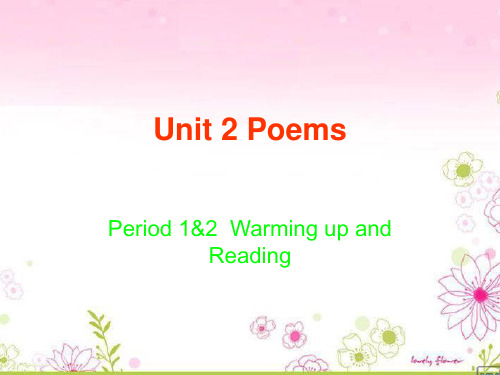
Wang Wei
( nature )
Bai Juyi
Shakespeare (1564—1616 )
Shelley (1792—1822 )
Types
funny
serious
realism
fantasy romantic classical
Song/Tang Dynasty
modern
ห้องสมุดไป่ตู้
Topics
Have a flexible line length and repeated phrases which give both a pattern and a rhythm to the poem
Made up of five lines, convey a strong picture in just a few words. Made up of 17 syllables; Give a clear picture and create a special feeling using the minimum of words. The translations have a free form.
Read for detailed information
Which Poem describes a person?
tells a story? describes an aspect of a season?
is about sport? is about things that don’t make sense?
is recited to a baby? describes a river scene? has rhyming words at the end of lines? repeats words or phrases?
2019_2020年高中英语Unit2PoemsSectionⅡWarmingUp(精编)
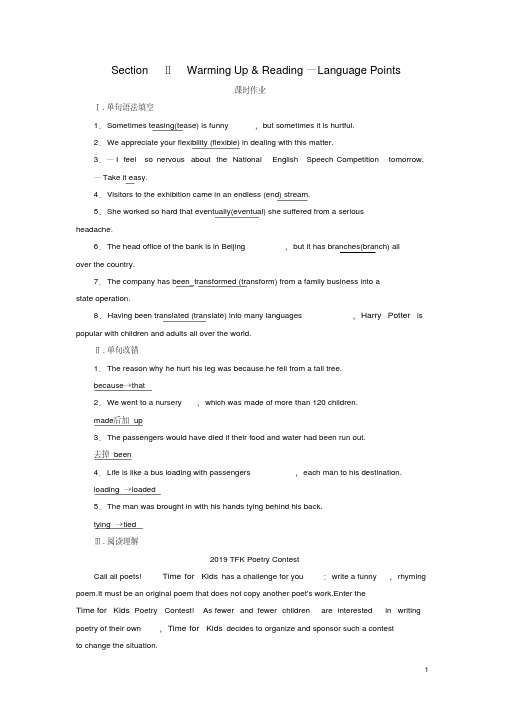
Section ⅡWarming Up & Reading—Language Points课时作业Ⅰ.单句语法填空1.Sometimes teasing(tease) is funny,but sometimes it is hurtful.2.We appreciate your flexibility (flexible) in dealing with this matter.3.—I feel so nervous about the National English Speech Competition tomorrow.—Take it easy.4.Visitors to the exhibition came in an endless (end) stream.5.She worked so hard that eventually(eventual) she suffered from a seriousheadache.6.The head office of the bank is in Beijing,but it has branches(branch) allover the country.7.The company has been_transformed (transform) from a family business into astate operation.8.Having been translated (translate) into many languages,Harry Potter is popular with children and adults all over the world.Ⅱ.单句改错1.The reason why he hurt his leg was because he fell from a tall tree.because→that2.We went to a nursery,which was made of more than 120 children.made后加up3.The passengers would have died if their food and water had been run out.去掉been4.Life is like a bus loading with passengers,each man to his destination.loading→loaded5.The man was brought in with his hands tying behind his back.tying→tiedⅢ.阅读理解2019 TFK Poetry ContestCall all poets! Time for Kids has a challenge for you:write a funny,rhyming poem.It must be an original poem that does not copy another poet's work.Enter theTime for Kids Poetry Contest! As fewer and fewer children are interested in writing poetry of their own,Time for Kids decides to organize and sponsor such a contestto change the situation.Contest Rules1.How to enter This contest begins at 1210 a.m. on March 6,2019 and endsat 1159 p.m. on July 24,2019.To enter,mail the following information to 1271Avenue of the Americas,32nd Floor,New York,New York 10020:(a) an original and previously unpublished poem that is humorous and has a rhyme scheme; (b) entrants' first name o nly and a parent's mail address.Limit one entry per person.When entering,entrants promise that the entry is original,and has not been published in any medium and has not won an award.2.Judging All entries will be judged by poet Kenn Nesbitt,based on the following criteria:creativity and originality (50%),use of language and rhyme (25%) and appropriateness to the theme of the contest (25%).The length of the entry will not be taken into consideration.3.Prizes Our judges will select four semi-finalists(参加半决赛的选手) from which one grand prize winner and three finalists will be chosen.The one grand prize winner will receive an online class visit from Children's Poet Laureate Kenn Nesbitt and a signed copy of his newest book of poetry,The Armpit of Doom Funny Poemsfor Kids,approximately value at $275.The three finalists will each get a signed copyof Nesbitt's newest book of poetry,The Armpit of Doom:Funny Poemsfor Kids,and both their poems and that of the grand prize winner will be published at .4.Eligibility(参赛资格) Open to legal citizens of the 50 United States andthe District of Columbia who are primary school students and are 8 to 13 years oldat time of entry.5.Winner's list For names of the winner and finalists,visit (after August 1,2019,available for a period of 10 days).【解题导语】为了激发孩子们写诗的兴趣,Time for Kids决定举办一次诗歌大赛。
高中英语Unit2PoemsSectionWarmingUpampReading课件新人教版选修
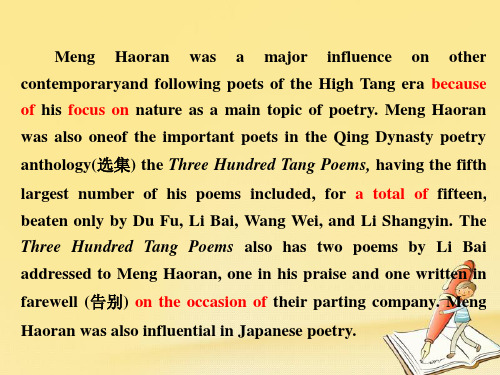
had done结构,主句用 should/would/could/mig ht+have done结构。
if we hadn't stayed up so late○30 the ○30 stay up late 熬夜
night before,
[原文呈现] if we hadn't taken it easy○31 ,
○25 coffin/'kɒfIn/n.棺材
[原文呈现]
I saw two sparrows ○26 run a
[读文清障]
race,
I saw two horses making lace○27 ,
I saw a girl just like a cat,
I saw a kitten○28 wear a hat,
Section Ⅰ Warming Up & Reading — Pre-reading
[原文呈现]
[读文清障]
A FEW SIMPLE FORMS OF ①why引导定语从句,修饰先行
ENGLISH POEMS There are various reasons why
词various reasons。关系副词
if we had trained harder,
have won ...。if从句用
if Ben had passed the ball to Joe, if we'd had thousands of fans screaming, if I hadn't taken my eye off the ball,
Some rhyme (like B) while others 并列连词,表示对比。 do not (like C)⑲.
高中英语Unit2PoemsPeriodⅠWarmingupReadingComprehending

Unit 2Period ⅠWarming up, Pre-reading, Reading & Comprehending一、1.The movie directed by an outstanding director a schoolgirl (把...变成) a superstar.2.Those officials are said to be not only talented but (受...欢迎)local villagers.whole meal was good and the wine (尤其)was excellent.4.—Oh, doctor, I have a pain in my leg.— (别紧张). Let me have a look.5.If we continue to destroy and waste the natural resources like this,we will(用完)them sooner or later.6.Two sparrows were heard (scream) in fear when I passed by the river.7.The head office of the bank is in Beijing, but it has scores of(branch) all over the world.(end) patience made her the best nurse in the hospital.9.This accident is a (repeat) of one that happened here two weeks ago.10.If you devote yourself to study, those maths problems are easy(solve) .二、Limericks (五行打油诗) are usually witty or humourous, and have five lines: the first two rhyme, the two in the middle rhyme, and the last line rhymes with the first two lines. Here is how to write a limerick.Pick what you would like your limerick to be about. It could be about mice, a tree, a person, or whatever.Don't end it with something you can’t rhyme - like "orange". Start it like "There once was a man who ate limes (酸橙)" or something like that.Your next line has to rhyme with the first line. If you use "There once was a man who ate limes", your second line could be like "He ate them all the time" or "And sampled various wines. Your limerick would now be like There once was a man who ate limes /And sampled various wines.The third and fourth lines have to be related to the first part of your limerick, but are not with the same rhyme. They could be like He wouldn't touch a tomato/ lt tasted too much Like potatoes or something along those lines.The fifth line must rhyme with the first two lines. Your last line could be like, "And potatoes, you know, do not shine" or something like that.Your entire limerick would be kind of like this: There once was a man who ate limes/ And sampled various wines/ He wouldn’t touch a tomato/ It tasted too much like potatoes/ And potatoes, you know, do not shine.If you don't li ke your limerick, you can always go back and change it. It’s not permanent.1.What should be cared about most to write limericks?A.The length.B.The rhyme.C.The structure.D.The style.2.From the text we can know that analyzing cause and effect.D.By following the time order.5.What might be the most suitable title for the text?A.How to analyze limericks exactly.B.How to write a limerick.C.How to appreciate a limerick.D.How to organize five lines into a limerick.三、HOW TO READ A POEMThere's really only one reason why poetry has gotten a reputation for being so "difficult": It demands your full attention. ①_________Follow Your Ears. I t’s okay to ask “What does it mean?” when you are reading a poem. But it’s even better to ask “How does it sound ?”② Even if you can’t understand a single thing about a poem’s“subject” or “theme”, you can always say something — anything — about the sound of the words.③OK, we’re not saying you have to shout it from the rooftops. If y ou’r e embarrassed and want to lock yourself in the attic (阁楼) and read the poem in the quietest whisper, go ahead. But reading aloud is really an effective way to understand a poem, because reading even part of it aloud can totally change your perspective on how it works.Read in Different Places. Just like music, the experience of poetry changes depending on your mood and the environment. Read in as many different places as possible: at the beach, on a mountain, in the subway. ④_____________ Think Li ke a Poet. Here’s a fun exercise. Go through the poem one line at a time, covering up the next line with your hand so you can’t see it. Put yourself in the poet’s shoes:⑤If you start to think like this, you’ll be able to appreciate all the different choices that go into making a poem.A.Be Patient.B.Read It Aloud.C.If all else fails, treat it like a song.D.If I had to write a line to come after this line, what would I put?E.So if you don’t get it, set the poem aside and come back to it lat er.F.Sometimes all it takes is a change of scenery for a poem to really come alive.G.Here is a short list of tips that will make poems reading more enjoyable.答案以及解析一、1.答案:transformed into2.答案:popular with3.答案:in particular4.答案:Take it easy5.答案:run out of6.答案:screaming解析:【解题思路】考査非谓语动词。
高二英语 Unit 2《PoemsWarming Up,Prereading and Reading
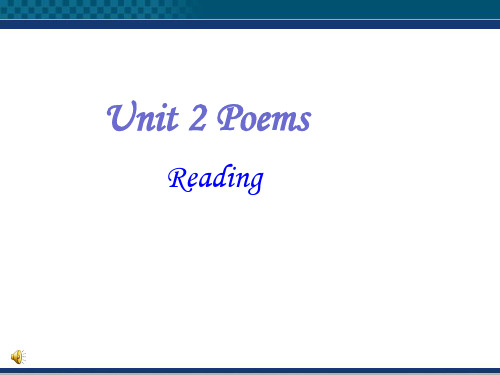
Haiku 俳句诗
Poetry is a great form of literature. There are different kinds of rules for poems, so the forms of poems are quite different from country to country. The passage in Reading will tell us something about forms of English poems. Now read the text on P 10 and find out information to complete the following form.
Nursery rhymes, List poems, the Cinquain, Haiku and Tang poems.
Which poems give you one clear picture in your mind?
Most probably Poems F, G.
Poem D,E
The translations have a free form.
Hush, little baby, don’t say a word, Papa’s going to buy you a mockingbird. If that mockingbird won’t sing, Papa’s going to buy you a diamond ring. If that diamond ring turns to brass, Papa’s going to buy you a looking glass. If that looking-glass gets broke, Papa’s going to buy you a billy-goat If that billy-goat runs away, Papa is going to buy you another today.
高中英语 Unit 2 Poems Section Ⅰ— Warming Up Pre-readin
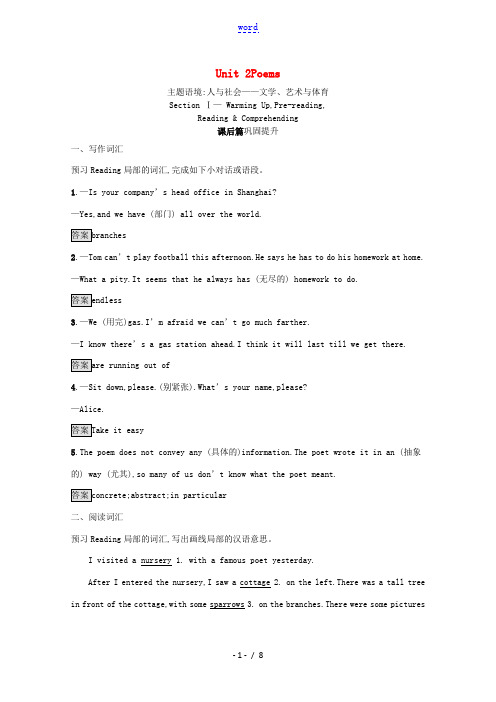
Unit 2Poems主题语境:人与社会——文学、艺术与体育Section Ⅰ— Warming Up,Pre-reading,Reading & Comprehending课后篇巩固提升一、写作词汇预习Reading局部的词汇,完成如下小对话或语段。
1.—Is your company’s head office in Shanghai?—Yes,and we have (部门) all over the world.2.—Tom can’t play football this afternoon.He says he has to do his homework at home. —What a pity.It seems that he always has (无尽的) homework to do.3.—We (用完)gas.I’m afraid we can’t go much farther.—I know there’s a gas station ahead.I think it will last till w e get there.4.—Sit down,please.(别紧张).What’s your name,please?—Alice.5.The poem does not convey any (具体的)information.The poet wrote it in an (抽象的) way (尤其),so many of us don’t know what the poet meant.二、阅读词汇预习Reading局部的词汇,写出画线局部的汉语意思。
I visited a nursery 1. with a famous poet yesterday.After I entered the nursery,I saw a cottage 2. on the left.There was a tall tree in front of the cottage,with some sparrows 3. on the branches.There were some pictureswith diamond 4.patterns 5. on the wall on the right.I also saw the children reciting the nursery rhymes 6. aloud.How happy they were!托儿所 2.小屋 3.麻雀 4.菱形 5.图案6.押韵的词三、根据括号内的提示,将如下句子补充完整1.随着电子商务日益开展,我们已经习惯了网上购物。
高中英语Unit2PoemsWarmingUpReading练习(含解析)新人教版选修

Unit 2 Warming Up & ReadingⅠ. 选词填空stay up, be popular with, in particular, take it easy, make sense, run out of, be made up of, make up1. The teacher asked the students to make up a poem about friendship.2. The commission is made up of five people, including two women.3. I need your help, for I have run out of my money.4. It doesn’t make sense to buy the cheapest brand of computer just to save a few dollars.5. They do bad work because they want to take it easy and still get paid.6. Why should he notice her car in particular?7. The film directed by that British is popular with young people.8. It is typical of students to stay up reading till late at night before the final exam.Ⅱ. 单句改错1. They asked me to convey their sincere apology for you. (for→to)2. Take it easily; it’s not a serious problem. (easily→easy)3. She felt that she had run out inspiration. (out后加of)4. She is so particular to her housework that servants will not work for her.(to→about)5. Sometimes tease is funny, but sometimes it is hurtful. (tease→teasing)6. She worked so hard that eventual she suffered from a serious headache.(eventual→eventually)7. He likes pop music when I am fond of folk music. (when→while)8. With his mother help him, he is getting along well with his work.(help→helping)Ⅲ. 完成句子1. Most of my classmates wanted to go to a park while I had an idea of going toa nicer place.我的大部分同学想去公园, 然而我有一个去更好的地方的主意。
2019_2020学年高中英语Unit2Poems2SectionⅡWarmingUp

别着急,慢慢来
take sth. seriously
重视某事,对某事严肃对待
take...for granted
认为……理所当然
①If you take it easy for a while, you will get better more quickly. 如果你放松一段时间,你就会好得更快一些。 ②Some of us always take it for granted that our parents or grandparents should take care of us. 我们中的有些人理所当然地认为父母或者祖父母应该照顾我 们。
常为物)
give out
用尽,精疲力竭(不及物动词短语)
use up
用完,消耗尽(及物动词短语)
①We would have finished the task on time if we hadn’t run out of energy. 如果我们没有精疲力竭,我们将准时完成任务。 ②As far as I know, their spare supply of food is running out. 据我所知, 他们的食物储备快用完了。 ③His strength gave out after he ran that long distance. 跑完那么长一段距离,他已经精疲力竭。
[即学即练]——用 take 的相关短语填空 ①____T_a_k_e__y_o_u_r_t_im__e___; there’s a lot of time left. ②Believe it or not, I always__ta_k__e_ your suggestions s_e_r_i_o_u_s_ly_. ③ No matter how difficult the matter is, the wise man always_t_a_k_e_s_i_t_e_a_s_y_.
高中英语 Unit 2 Poems Section Ⅱ Warming amp;Reading

Unit 2 Poems Section Ⅱ Warming amp;ReadingLanguage Points一、这样记单词(有的)看起来自相矛盾,但是它们容易学,也容易背诵。
掉。
3.Some rhyme (like B) whileothers do not (like C).有些(清单诗)押韵(如B),而有些不押韵(如C)。
while意为“然而”,表示两者之间的对照。
Their sizes and colors aresimilarwhile_the_shapes_are_different.它们的大小、颜色是相似的,然而形状不同。
4.Another simple form of poem that students can easily write is the cinquain, a poem made up offive lines.另外一种学生容易写的简体诗是由五行组成的,叫作五行诗。
名词短语作同位语。
I'm Li Hua,a_student_from_China.(2014·全国卷Ⅰ书面表达)我是李华,一位来自中国的中学生。
5.With so many different forms of poetry to choose from,students mayeventually want to write poems of their own.有这么多不同的诗歌类型可选,学生们最终也许想自己作诗了。
“with+宾语+宾补”结构,本句中充当宾补的是不定式短语。
With_so_much_work_to_do,_they have no time to goshopping.有这么多工作要做,他们没有时间去购物。
1.(教材P10)Others try to convey certain emotions.而有些(诗)则试图传达某种感情。
convey vt.传达;运送convey sth.to sb. 向某人传达某事convey sth./sb.to some place 把某物/某人送到某地①Please convey my thanks to your wife.请向你的妻子转达我的谢意。
高中英语 Unit 2 Poems Section Ⅰ Warming amp;Reading Pr
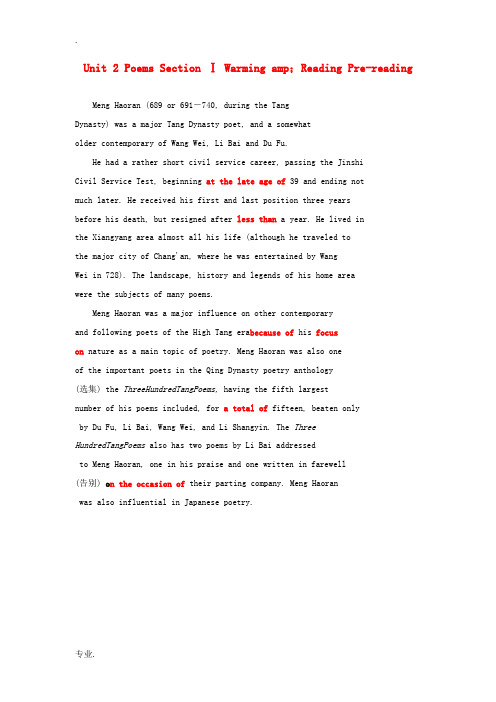
Unit 2 Poems Section Ⅰ Warming amp;Reading Pre-readingMeng Haoran (689 or 691-740, during the TangDynasty) was a major Tang Dynasty poet, and a somewhatolder contemporary of Wang Wei, Li Bai and Du Fu.He had a rather short civil service career, passing the JinshiCivil Service Test, beginning at the late age of 39 and ending notmuch later. He received his first and last position three yearsbefore his death, but resigned after less than a year. He lived inthe Xiangyang area almost all his life (although he traveled tothe major city of Chang'an, where he was entertained by WangWei in 728). The landscape, history and legends of his home areawere the subjects of many poems.Meng Haoran was a major influence on other contemporaryand following poets of the High Tang era because of his focuson nature as a main topic of poetry. Meng Haoran was also oneof the important poets in the Qing Dynasty poetry anthology(选集) the ThreeHundredTangPoems, having the fifth largestnumber of his poems included, for a total of fifteen, beaten onlyby Du Fu, Li Bai, Wang Wei, and Li Shangyin. The ThreeHundredTangPoems also has two poems by Li Bai addressedto Meng Haoran, one in his praise and one written in farewell(告别) o n the occasion of their parting company. Meng Haoranwas also influential in Japanese poetry.Section_ⅠWarming Up & Reading —Prereading [原文呈现][读文清障][课文翻译]A FEW SIMPLE FORMS OF ENGLISHPOEMSThere are various reasons why people write poetry①. Some poems tell a story or describe something in a way that will give the reader a strong impression②. Others try to convey③certain emotions④. Poets use many different forms of poetry to express themselves. In this text, however, we will look at a few of the simpler forms.Some of the first poetry a young child learns in English⑤is nursery rhymes⑥. These rhymes like the one on the right (A) are still a common type of children's poetry. The language is concrete ⑦but imaginative, and they delight small children because they rhyme, have strong rhythm and a lot of repetition⑧. The poems may not make sense and even seem contradictory⑨, but they are easy to learn and recite. By ①why引导定语从句,修饰先行词various reasons。
- 1、下载文档前请自行甄别文档内容的完整性,平台不提供额外的编辑、内容补充、找答案等附加服务。
- 2、"仅部分预览"的文档,不可在线预览部分如存在完整性等问题,可反馈申请退款(可完整预览的文档不适用该条件!)。
- 3、如文档侵犯您的权益,请联系客服反馈,我们会尽快为您处理(人工客服工作时间:9:00-18:30)。
Unit 2 Poems Section Ⅱ Warming amp;Reading Language Points一、这样记单词二、这样记短语三、这样记句式1.(教材P10)Others try to convey certain emotions. 而有些(诗)则试图传达某种感情。
convey vt.传达;运送 请向你的妻子转达我的谢意。
②His determined look conveyed (convey) his meaning that all the injured should be conveyed from the spot to the hospital at once.他坚定的表情表达了他的想法:所有的伤员应该立即从现场转移到医院。
2.(教材P10)List poems have a flexible line length and repeated phrases which give both a pattern and a rhythm to the poem.清单诗可长可短较为灵活且有重复的短语,这就形成了这种诗的固定句型和节奏。
flexible adj.灵活的;可弯曲的;柔顺的这个月,我的日程安排有很大的灵活性。
②The company appreciates a more_flexible design.这家公司喜欢更灵活的设计。
③Leather and rubber are flexible, while glass and iron are not.皮革和橡胶都是易弯曲的,而玻璃和铁则不然。
④Computers offer a much greater degree of flexibility (flexible) in the way work is organized.利用计算机,工作安排可以灵活得多。
3.(教材P10)... if we hadn't taken it easy.……如果我们没有放松警惕。
take it easy(=take things easy)轻松;不紧张;从容①—I feel so nervous about the National English Speech Competition tomorrow.—Take it easy.(2013·四川高考单选)——我对明天的全国英语演讲比赛感觉很紧张。
——放松些。
[名师点津] take it/things easy是习惯用语,其中easy用作副词,不能换成easily。
Believe it or not, I always take your suggestions seriously (serious)信不信由你,我总是认真对待你的建议。
③Some of us always take_it_for_granted_that our parents or grandparents should take care of us.我们中的有些人理所当然地认为父母或者祖父母应该照顾我们。
[辨析比较] take it easy, take one's time④Take_your_time;_we still have 20 minutes left.⑤Take_it_easy and tell us what happened.4.(教材P10)... if we hadn't run out of energy.……如果我们没有精疲力竭。
run out of用完;用尽①They ran out of money and had to abandon the project.他们没有钱了,不得不放弃那项计划。
[辨析比较] run out of, run out, give out, use up②She has run_out_of/used_up her money and her patience is also running_out.③His strength gave_out after he ran that long distance.④My money has been used_up,_so I have to return home.5.(教材P10)Another simple form of poem that students can easily write is the cinquain, a poem made up of five lines.另外一种学生容易写的简体诗是由五行组成的,叫作五行诗。
be made up of 由……构成这个团体是由医生组成的。
②We're working hard to try to make up for lost time.我们在努力工作,试图补偿失去的时间。
③Can you make_out what this means?你能理解这是什么意思吗?[名师点津] (1)be made up of的主动形式为make up,意为“组成;构成”。
(2)be made up of与be composed of/consist of同义;其中consist of为主动形式表示被动的意义,不用于进行时及被动语态。
④12 members make up the team.→The team is_composed_of 12 members.→The team consists_of 12 members.这个队由十二个成员组成。
6.(教材P11)A fallen blossom is coming back to the branch.落下的花朵回到了树枝上。
branch n. [C]枝条;支流;部门;支线;分店①The gardener cut off a branch from the tree.枝条②Another branch joins the main railway in this city.支线③Mr. Smith works in an executive (行政) branch of the government.部门④The river has two main branches along its way to the sea.支流7.(教材P11)Never looking back, transformed into stone.化为石,不回头。
transform vt.&vi.转化;转换;改造;变换成功和财富改变了他的性格。
②He was_transformed_into a controversial figure, which affected his reputationa great deal.他变成了一个有争议的人物,这对他的名声影响很大。
③Every moment of every day, energy is being transformed from one form into another.每时每刻,能量都在由一种形式转换成另一种形式。
8.(教材P11)Did you know that English speakers also enjoy other forms of Asian poetry — Tang poems from China in particular?你知道吗?说英语的人也喜欢其他类型的亚洲诗——尤其是中国的唐诗。
in particular (=particularly)尤其;特别整顿饭都很好,尤其是葡萄酒更好。
②The boy is very particular about/over his food.这个男孩吃饭很挑剔。
③As is known to all, pandas are particular to China.众所周知,熊猫是中国所特有的。
1.Some rhyme (like B) while others do not (like C).有些(清单诗)押韵(如B),而有些不押韵(如C)。
(1)本句中while为并列连词,表示对比,意为“而;然而”。
①He likes playing basketball, while I like listening to music.他喜欢打篮球,而我喜欢听音乐。
(2)while用作从属连词,引导时间状语从句,意为“当……时”,与延续性动词搭配。
②While_I_was_cooking,_the children were playing outside.我在做饭时,孩子们都在外面玩。
(3)while用作从属连词,引导让步状语从句,意为“虽然……但是……”,多放于句首。
③While_she_is_a_lovely_girl,_she can be extremely difficult to work with.她虽然是个可爱的女孩,但有时却极难与其共事。
(4)while用作从属连词,引导条件状语从句,意为“只要”。
④While_there_is_life,_there is hope.只要生命存在,就有希望。
(5)while用作名词,意为“一会儿;一段时间”。
⑤She likes to lie down for a while after lunch.她喜欢午饭后躺一会儿。
2.With so many different forms of poetry to choose from, students may eventually want to write poems of their own.有这么多不同的诗歌类型可选,学生们最终也许想自己作诗了。
句中的“With so many different forms of poetry to choose from”为with的复合结构作状语。
其结构如下:with +宾语+⎩⎪⎨⎪⎧doing(表示主动、进行)done(表示被动、完成)to do(表示将来的动作)介词短语/adj ./adv .①With time passing by , they have grown into big boys and big girls. 随着时间的流逝,他们都长成大小伙子和大姑娘了。
②With all the things bought (buy), she went home happily. 买了所有东西后,她高兴地回家了。
③With several problems to_solve (solve), we still need to hold another meeting as soon as possible.有一些问题尚待解决,因此我们还需尽快再召开一次会议。
